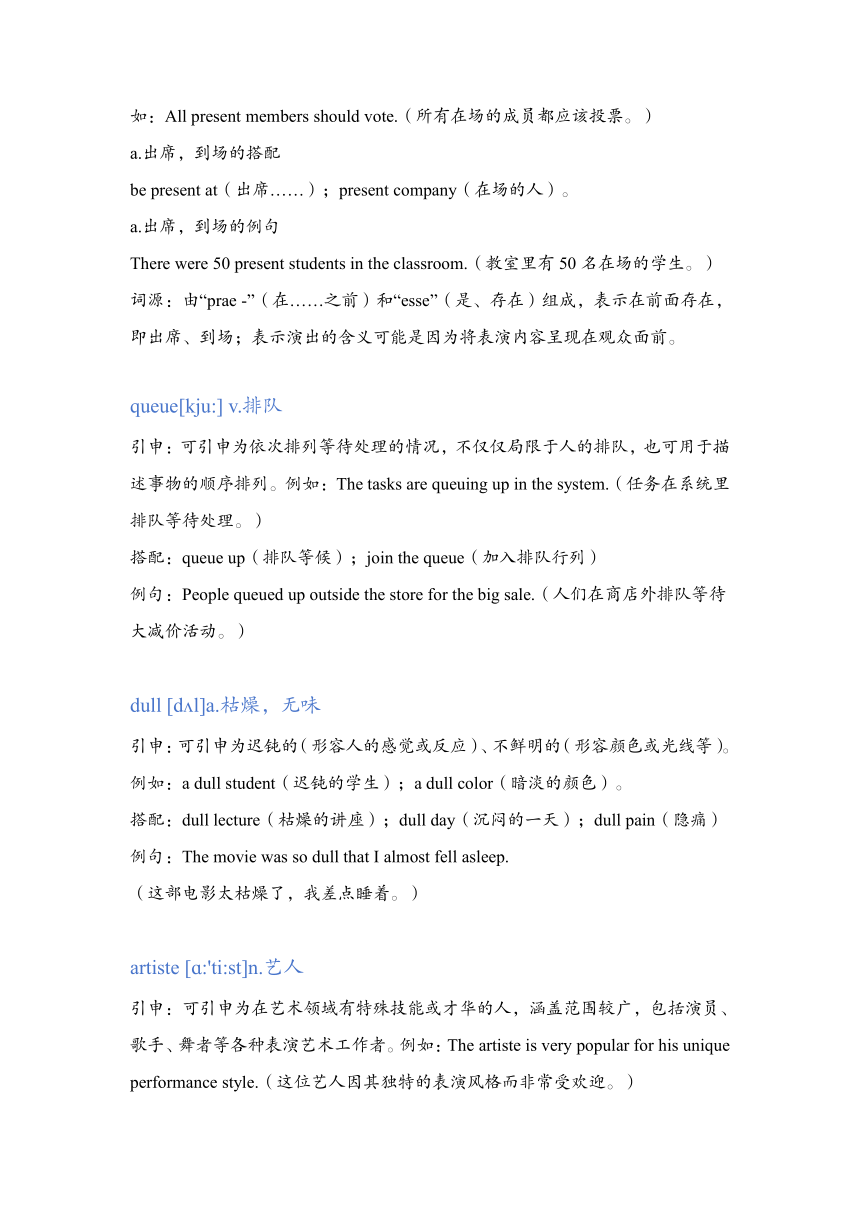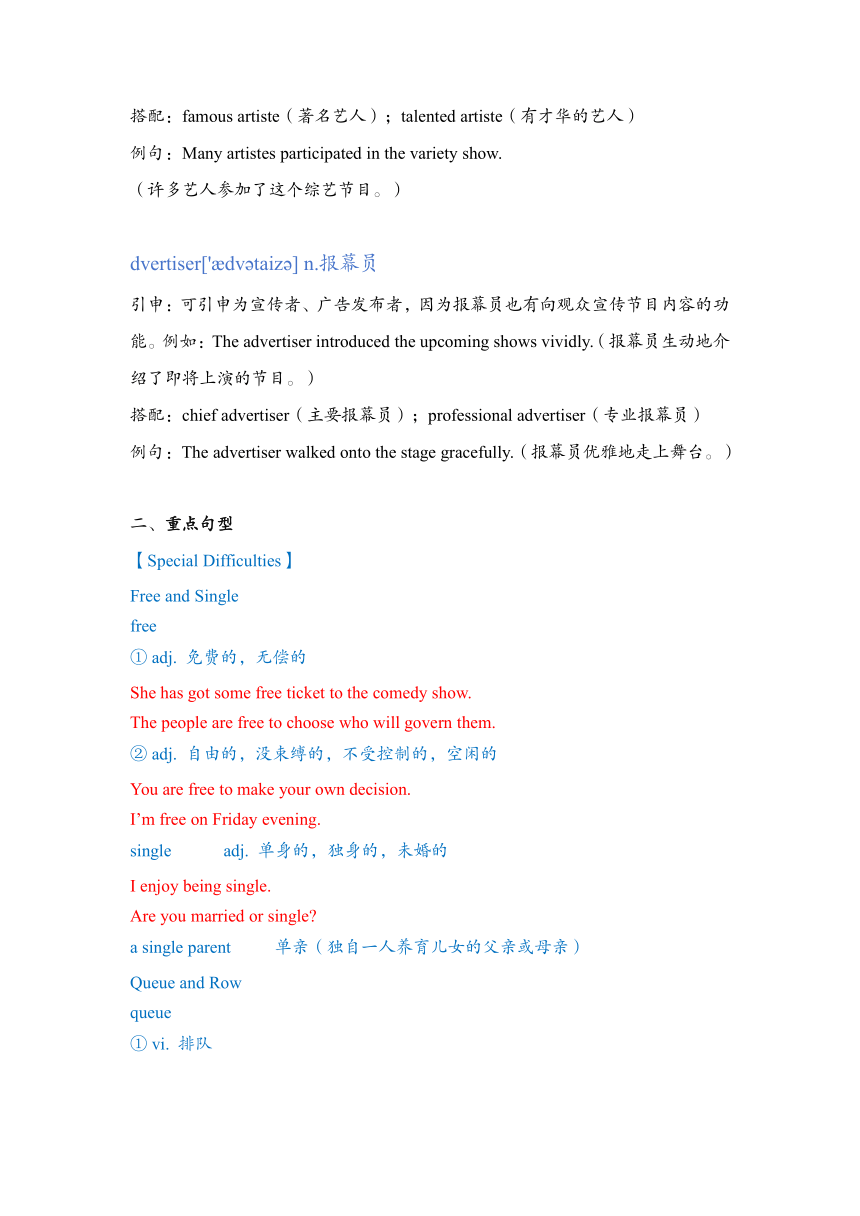新概念第二册Lesson 89 A slip of the tongue讲义
文档属性
| 名称 | 新概念第二册Lesson 89 A slip of the tongue讲义 |  | |
| 格式 | docx | ||
| 文件大小 | 118.0KB | ||
| 资源类型 | 教案 | ||
| 版本资源 | 新概念英语 | ||
| 科目 | 英语 | ||
| 更新时间 | 2024-11-25 19:45:37 | ||
图片预览



文档简介
新概念第二册
Lesson 89 A slip of the tongue
单词精讲
slip[slip] n.小错误
引申:可引申为小失误、疏漏,在行为或言语上不经意出现的小差错。例如:a slip of the tongue(口误,舌头的小失误)。
搭配:make a slip(犯小错误);a slip - up(小差错,失误)
例句:He made a slip in his calculation.(他在计算中犯了一个小错误。)
comedy ['k midi] n.喜剧
引申:可引申为具有喜剧性、幽默诙谐的事件或情况。例如:The whole situation was a comedy of errors.(整个情况是一出错误百出的喜剧。)
搭配:comedy show(喜剧表演);comedy film(喜剧电影);black comedy(黑色喜剧,一种以荒诞、讽刺为特点的喜剧形式)。
例句:We watched a really funny comedy last night.
(我们昨晚看了一部非常有趣的喜剧。)
present[pri'zent, 'prez nt] v.演出 a.出席,到场的
搭配:v.演出引申
可引申为展示、呈现(某种艺术形式或表演内容)。例如:The theater will present a new play next month.(剧院下个月将演出一部新剧。)
v.演出搭配
present a performance(进行一场演出);present a concert(举办一场音乐会)。
v.演出例句
They will present a magic show tonight.(他们今晚将表演一场魔术秀。)
a.出席,到场的引申
可引申为存在的、当前的(表示在某个特定的场合或时间是存在或出现的)。例如:All present members should vote.(所有在场的成员都应该投票。)
a.出席,到场的搭配
be present at(出席……);present company(在场的人)。
a.出席,到场的例句
There were 50 present students in the classroom.(教室里有50名在场的学生。)
词源:由“prae -”(在……之前)和“esse”(是、存在)组成,表示在前面存在,即出席、到场;表示演出的含义可能是因为将表演内容呈现在观众面前。
queue[kju:] v.排队
引申:可引申为依次排列等待处理的情况,不仅仅局限于人的排队,也可用于描述事物的顺序排列。例如:The tasks are queuing up in the system.(任务在系统里排队等待处理。)
搭配:queue up(排队等候);join the queue(加入排队行列)
例句:People queued up outside the store for the big sale.(人们在商店外排队等待大减价活动。)
dull [d l]a.枯燥,无味
引申:可引申为迟钝的(形容人的感觉或反应)、不鲜明的(形容颜色或光线等)。例如:a dull student(迟钝的学生);a dull color(暗淡的颜色)。
搭配:dull lecture(枯燥的讲座);dull day(沉闷的一天);dull pain(隐痛)
例句:The movie was so dull that I almost fell asleep.
(这部电影太枯燥了,我差点睡着。)
artiste [ɑ:'ti:st]n.艺人
引申:可引申为在艺术领域有特殊技能或才华的人,涵盖范围较广,包括演员、歌手、舞者等各种表演艺术工作者。例如:The artiste is very popular for his unique performance style.(这位艺人因其独特的表演风格而非常受欢迎。)
搭配:famous artiste(著名艺人);talented artiste(有才华的艺人)
例句:Many artistes participated in the variety show.
(许多艺人参加了这个综艺节目。)
dvertiser[' dv taiz ] n.报幕员
引申:可引申为宣传者、广告发布者,因为报幕员也有向观众宣传节目内容的功能。例如:The advertiser introduced the upcoming shows vividly.(报幕员生动地介绍了即将上演的节目。)
搭配:chief advertiser(主要报幕员);professional advertiser(专业报幕员)
例句:The advertiser walked onto the stage gracefully.(报幕员优雅地走上舞台。)
重点句型
【Special Difficulties】
Free and Single
free
① adj. 免费的,无偿的
She has got some free ticket to the comedy show.
The people are free to choose who will govern them.
② adj. 自由的,没束缚的,不受控制的,空闲的
You are free to make your own decision.
I’m free on Friday evening.
single adj. 单身的,独身的,未婚的
I enjoy being single.
Are you married or single
a single parent 单亲(独自一人养育儿女的父亲或母亲)
Queue and Row
queue
① vi. 排队
We had to queue for hours to get in.
She has to queue for the bus every morning.
② n.(按顺序等待的人、车等的)行列、队(通常为纵队)
There’s a long queue/line of people waiting for the bus.
We’d better join the queue for tickets.
row n.(人或物的)一排、一行(通常为横的)
You can see me in this old photo, standing in the back row.
Please put the desks in four rows.
Funny
① adj. 有趣的,滑稽的,逗人发笑的(与amusing同义)
He included a large number of funny stories in his speech.
② adj. 反常的,古怪的,奇怪的(口语)
I thought there was something funny about the parcel, so I phoned the police.
This morning I saw her wearing a funny hat which looked like a lighthouse.
课文精讲
A slip of the tongue 口误,说走了嘴,失言
Are you sure that it was just a slip of tongue 你确信那只是一时口误吗?
People will do anything to see a free show -- even if it is a bad one.
人们总要想尽办法看不花钱的演出——哪怕是拙劣的演出。
anything用于肯定句时表示“不论什么,任何事情”,to see a free show表示目的,也可以用for +名词形式:
He will do anything to save his child’s life.
He will do anything for the child.
When the news got round that a comedy show would be presented at our local cinema by the P. and U. Bird Seed Company, we all rushed to see it.
当“皮尤”鸟食公司将在我们当地影院演出喜剧节目的消息传开后,我们都赶紧跑去观看。
get round = get around/about 四处传遍,(消息、谣言等)传开
The word soon got round that there was buried treasure in that cave.
Bad news gets round quickly.
We had to queue for hours to get in and there must have been several hundred people present just before the show began.
我们不得不排了好几个小时才进得场去。在演出开始前场内肯定已有好几百人了。
这是一个并列句,由“and”连接两个分句。第一个分句“We had to queue for hours to get in”中,“We”是主语,“had to queue”是情态动词加动词原形结构,表示不得不排队,“for hours”是时间状语,“to get in”是不定式短语作目的状语。第二个分句“there must have been several hundred people present just before the show began”是存在句的完成式,“must have been”表示对过去情况的肯定推测,“several hundred people”是主语,“present”是形容词作后置定语,表示在场的,“just before the show began”是时间状语从句。
“queue”表示排队,“present”在这里表示在场的。
Unfortunately, the show was one of the dullest we have ever seen.
不幸的是,这次演出是我们看过的最乏味的演出了。
这是一个主从复合句。“the show was one of the dullest”是主句,“the show”是主语,“was”是谓语,“one of the dullest”是表语,其中“dullest”是“dull”的最高级形式。“we have ever seen”是定语从句,修饰先行词“the dullest”,在这个定语从句中,“we”是主语,“have ever seen”是现在完成时,表示曾经看到过。
“unfortunately”是副词,表示不幸地,“dull”表示枯燥、无味。
Those who failed to get in need not have felt disappointed, as many of the artistes who should have appeared did not come.
那些没能进到场内的人没有必要感到失望,因为很多应该出场的专业演员都没有来。
这是一个主从复合句。“Those who failed to get in need not have felt disappointed”是主句,其中“Those”是主语,“who failed to get in”是定语从句,修饰“Those”,“failed to get in”表示未能进入,“need not have felt disappointed”是情态动词加完成式结构,表示本不必感到失望。“as many of the artistes who should have appeared did not come”是原因状语从句,其中“as”是引导词,表示因为,“many of the artistes”是主语,“who should have appeared”是定语从句,修饰“the artistes”,“should have appeared”表示本应该出现,“did not come”是谓语,表示没有来。
“fail to do sth.”表示未能做某事,“need not have done sth.”表示本不必做某事,“should have done sth.”表示本应该做某事。
The only funny things we heard that evening came from the advertiser at the beginning of the programme.
那天晚上唯一有趣的事情是节目开始时那个报幕员的开场白。
这是一个主从复合句。“The only funny things we heard that evening came from the advertiser at the beginning of the programme.”中,“The only funny things”是主语,“we heard that evening”是定语从句,修饰“things”,“came from”是谓语,表示来自,“the advertiser”是宾语,“at the beginning of the programme”是时间状语。
“funny”表示有趣的,“advertiser”在这里指报幕员。
He was obviously very nervous and for some minutes stood awkwardly before the microphone.他显然非常紧张,局促不安地在麦克风前站了好几分钟。
这是一个并列句,由“and”连接两个分句。第一个分句“He was obviously very nervous”中,“He”是主语,“was”是谓语,“obviously very nervous”是表语。第二个分句“for some minutes stood awkwardly before the microphone”中,“for some minutes”是时间状语,“stood”是谓语,表示站,“awkwardly”是副词作状语,表示笨拙地,“before the microphone”是地点状语。
“obviously”是副词,表示明显地,“awkwardly”表示笨拙地。
As soon as he opened his mouth, everyone burst out laughing.
但他刚一开口说话,人们便哄堂大笑起来。
burst out 突然……起来(后面常接动名词,或in/into+名词)
When she heard that her father had died in the accident, she burst out crying.
At the sight of the drunk, everyone burst out laughing/in laughter.
“as soon as”表示一……就……
We all know what the poor man should have said, but what he actually said was: 'This is the Poo and Ee Seed Bird Company. Good ladies, evening and gentlemen!"
我们都明白那个可怜的人应该说些什么,而他实际说的却是:“这是‘浦伊’鸟食公司,好女士们,晚上和先生们!”
这是一个并列句,由“but”连接两个分句。第一个分句“We all know what the poor man should have said”是主从复合句,“We”是主语,“all”是副词作状语,表示全部,“know”是谓语,“what the poor man should have said”是宾语从句,“the poor man”是从句主语,“should have said”是情态动词加完成式结构,表示本应该说。第二个分句“what he actually said was: 'This is the Poo and Ee Seed Bird Company. Good ladies, evening and gentlemen!"”也是主从复合句,“what he actually said”是主语从句,“he”是从句主语,“actually said”是谓语,“was”是主句谓语,后面的内容是表语。
“actually”是副词,表示实际上。
Lesson 89 A slip of the tongue
单词精讲
slip[slip] n.小错误
引申:可引申为小失误、疏漏,在行为或言语上不经意出现的小差错。例如:a slip of the tongue(口误,舌头的小失误)。
搭配:make a slip(犯小错误);a slip - up(小差错,失误)
例句:He made a slip in his calculation.(他在计算中犯了一个小错误。)
comedy ['k midi] n.喜剧
引申:可引申为具有喜剧性、幽默诙谐的事件或情况。例如:The whole situation was a comedy of errors.(整个情况是一出错误百出的喜剧。)
搭配:comedy show(喜剧表演);comedy film(喜剧电影);black comedy(黑色喜剧,一种以荒诞、讽刺为特点的喜剧形式)。
例句:We watched a really funny comedy last night.
(我们昨晚看了一部非常有趣的喜剧。)
present[pri'zent, 'prez nt] v.演出 a.出席,到场的
搭配:v.演出引申
可引申为展示、呈现(某种艺术形式或表演内容)。例如:The theater will present a new play next month.(剧院下个月将演出一部新剧。)
v.演出搭配
present a performance(进行一场演出);present a concert(举办一场音乐会)。
v.演出例句
They will present a magic show tonight.(他们今晚将表演一场魔术秀。)
a.出席,到场的引申
可引申为存在的、当前的(表示在某个特定的场合或时间是存在或出现的)。例如:All present members should vote.(所有在场的成员都应该投票。)
a.出席,到场的搭配
be present at(出席……);present company(在场的人)。
a.出席,到场的例句
There were 50 present students in the classroom.(教室里有50名在场的学生。)
词源:由“prae -”(在……之前)和“esse”(是、存在)组成,表示在前面存在,即出席、到场;表示演出的含义可能是因为将表演内容呈现在观众面前。
queue[kju:] v.排队
引申:可引申为依次排列等待处理的情况,不仅仅局限于人的排队,也可用于描述事物的顺序排列。例如:The tasks are queuing up in the system.(任务在系统里排队等待处理。)
搭配:queue up(排队等候);join the queue(加入排队行列)
例句:People queued up outside the store for the big sale.(人们在商店外排队等待大减价活动。)
dull [d l]a.枯燥,无味
引申:可引申为迟钝的(形容人的感觉或反应)、不鲜明的(形容颜色或光线等)。例如:a dull student(迟钝的学生);a dull color(暗淡的颜色)。
搭配:dull lecture(枯燥的讲座);dull day(沉闷的一天);dull pain(隐痛)
例句:The movie was so dull that I almost fell asleep.
(这部电影太枯燥了,我差点睡着。)
artiste [ɑ:'ti:st]n.艺人
引申:可引申为在艺术领域有特殊技能或才华的人,涵盖范围较广,包括演员、歌手、舞者等各种表演艺术工作者。例如:The artiste is very popular for his unique performance style.(这位艺人因其独特的表演风格而非常受欢迎。)
搭配:famous artiste(著名艺人);talented artiste(有才华的艺人)
例句:Many artistes participated in the variety show.
(许多艺人参加了这个综艺节目。)
dvertiser[' dv taiz ] n.报幕员
引申:可引申为宣传者、广告发布者,因为报幕员也有向观众宣传节目内容的功能。例如:The advertiser introduced the upcoming shows vividly.(报幕员生动地介绍了即将上演的节目。)
搭配:chief advertiser(主要报幕员);professional advertiser(专业报幕员)
例句:The advertiser walked onto the stage gracefully.(报幕员优雅地走上舞台。)
重点句型
【Special Difficulties】
Free and Single
free
① adj. 免费的,无偿的
She has got some free ticket to the comedy show.
The people are free to choose who will govern them.
② adj. 自由的,没束缚的,不受控制的,空闲的
You are free to make your own decision.
I’m free on Friday evening.
single adj. 单身的,独身的,未婚的
I enjoy being single.
Are you married or single
a single parent 单亲(独自一人养育儿女的父亲或母亲)
Queue and Row
queue
① vi. 排队
We had to queue for hours to get in.
She has to queue for the bus every morning.
② n.(按顺序等待的人、车等的)行列、队(通常为纵队)
There’s a long queue/line of people waiting for the bus.
We’d better join the queue for tickets.
row n.(人或物的)一排、一行(通常为横的)
You can see me in this old photo, standing in the back row.
Please put the desks in four rows.
Funny
① adj. 有趣的,滑稽的,逗人发笑的(与amusing同义)
He included a large number of funny stories in his speech.
② adj. 反常的,古怪的,奇怪的(口语)
I thought there was something funny about the parcel, so I phoned the police.
This morning I saw her wearing a funny hat which looked like a lighthouse.
课文精讲
A slip of the tongue 口误,说走了嘴,失言
Are you sure that it was just a slip of tongue 你确信那只是一时口误吗?
People will do anything to see a free show -- even if it is a bad one.
人们总要想尽办法看不花钱的演出——哪怕是拙劣的演出。
anything用于肯定句时表示“不论什么,任何事情”,to see a free show表示目的,也可以用for +名词形式:
He will do anything to save his child’s life.
He will do anything for the child.
When the news got round that a comedy show would be presented at our local cinema by the P. and U. Bird Seed Company, we all rushed to see it.
当“皮尤”鸟食公司将在我们当地影院演出喜剧节目的消息传开后,我们都赶紧跑去观看。
get round = get around/about 四处传遍,(消息、谣言等)传开
The word soon got round that there was buried treasure in that cave.
Bad news gets round quickly.
We had to queue for hours to get in and there must have been several hundred people present just before the show began.
我们不得不排了好几个小时才进得场去。在演出开始前场内肯定已有好几百人了。
这是一个并列句,由“and”连接两个分句。第一个分句“We had to queue for hours to get in”中,“We”是主语,“had to queue”是情态动词加动词原形结构,表示不得不排队,“for hours”是时间状语,“to get in”是不定式短语作目的状语。第二个分句“there must have been several hundred people present just before the show began”是存在句的完成式,“must have been”表示对过去情况的肯定推测,“several hundred people”是主语,“present”是形容词作后置定语,表示在场的,“just before the show began”是时间状语从句。
“queue”表示排队,“present”在这里表示在场的。
Unfortunately, the show was one of the dullest we have ever seen.
不幸的是,这次演出是我们看过的最乏味的演出了。
这是一个主从复合句。“the show was one of the dullest”是主句,“the show”是主语,“was”是谓语,“one of the dullest”是表语,其中“dullest”是“dull”的最高级形式。“we have ever seen”是定语从句,修饰先行词“the dullest”,在这个定语从句中,“we”是主语,“have ever seen”是现在完成时,表示曾经看到过。
“unfortunately”是副词,表示不幸地,“dull”表示枯燥、无味。
Those who failed to get in need not have felt disappointed, as many of the artistes who should have appeared did not come.
那些没能进到场内的人没有必要感到失望,因为很多应该出场的专业演员都没有来。
这是一个主从复合句。“Those who failed to get in need not have felt disappointed”是主句,其中“Those”是主语,“who failed to get in”是定语从句,修饰“Those”,“failed to get in”表示未能进入,“need not have felt disappointed”是情态动词加完成式结构,表示本不必感到失望。“as many of the artistes who should have appeared did not come”是原因状语从句,其中“as”是引导词,表示因为,“many of the artistes”是主语,“who should have appeared”是定语从句,修饰“the artistes”,“should have appeared”表示本应该出现,“did not come”是谓语,表示没有来。
“fail to do sth.”表示未能做某事,“need not have done sth.”表示本不必做某事,“should have done sth.”表示本应该做某事。
The only funny things we heard that evening came from the advertiser at the beginning of the programme.
那天晚上唯一有趣的事情是节目开始时那个报幕员的开场白。
这是一个主从复合句。“The only funny things we heard that evening came from the advertiser at the beginning of the programme.”中,“The only funny things”是主语,“we heard that evening”是定语从句,修饰“things”,“came from”是谓语,表示来自,“the advertiser”是宾语,“at the beginning of the programme”是时间状语。
“funny”表示有趣的,“advertiser”在这里指报幕员。
He was obviously very nervous and for some minutes stood awkwardly before the microphone.他显然非常紧张,局促不安地在麦克风前站了好几分钟。
这是一个并列句,由“and”连接两个分句。第一个分句“He was obviously very nervous”中,“He”是主语,“was”是谓语,“obviously very nervous”是表语。第二个分句“for some minutes stood awkwardly before the microphone”中,“for some minutes”是时间状语,“stood”是谓语,表示站,“awkwardly”是副词作状语,表示笨拙地,“before the microphone”是地点状语。
“obviously”是副词,表示明显地,“awkwardly”表示笨拙地。
As soon as he opened his mouth, everyone burst out laughing.
但他刚一开口说话,人们便哄堂大笑起来。
burst out 突然……起来(后面常接动名词,或in/into+名词)
When she heard that her father had died in the accident, she burst out crying.
At the sight of the drunk, everyone burst out laughing/in laughter.
“as soon as”表示一……就……
We all know what the poor man should have said, but what he actually said was: 'This is the Poo and Ee Seed Bird Company. Good ladies, evening and gentlemen!"
我们都明白那个可怜的人应该说些什么,而他实际说的却是:“这是‘浦伊’鸟食公司,好女士们,晚上和先生们!”
这是一个并列句,由“but”连接两个分句。第一个分句“We all know what the poor man should have said”是主从复合句,“We”是主语,“all”是副词作状语,表示全部,“know”是谓语,“what the poor man should have said”是宾语从句,“the poor man”是从句主语,“should have said”是情态动词加完成式结构,表示本应该说。第二个分句“what he actually said was: 'This is the Poo and Ee Seed Bird Company. Good ladies, evening and gentlemen!"”也是主从复合句,“what he actually said”是主语从句,“he”是从句主语,“actually said”是谓语,“was”是主句谓语,后面的内容是表语。
“actually”是副词,表示实际上。
同课章节目录
